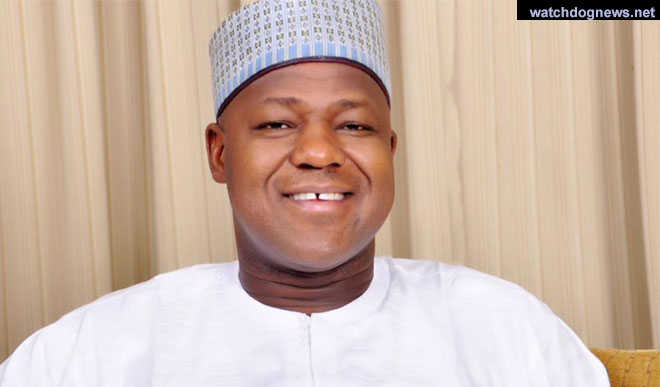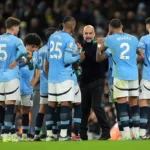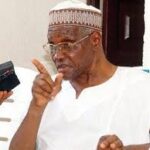
KEYNOTE ADDRESS BY RT. HON. YAKUBU DOGARA, SPEAKER, HOUSE OF REPRESENTATIVES OF THE FEDERAL REPUBLIC OF NIGERIA AS SPECIAL GUEST OF HONOUR AT THE 14TH DAILY TRUST DIALOGUE WITH THE TOPIC “BEYOND RECESSION: TOWARDS A RESILIENT ECONOMY”, HELD ON THURSDAY 19TH JANUARY 2017 AT NIGERIAN AIR FORCE (NAF) CONFERENCE CENTRE, ABUJA.
PROTOCOLS:
I should like to start by expressing my appreciation to the organisers, Media Trust Limited for affording me the opportunity to participate at this 14th Daily Trust Annual Interactive Dialogue as Special Guest of Honour and to present a keynote address. My commendation is reserved even more for the choice of the Theme “Beyond Recession: Towards a Resilient Economy” which not only speaks aptly to our present national challenge but also suggests optimism in effectively tackling the current recession and hence the need to look beyond it.
2. I am optimistic that with the Economic Recovery Programme measures being put in place by Government which I understand will soon be launched by the Executive, coupled with those planned in the 2017 budget, the economy will move out of recession not long from now. In this regard, even the International Monetary Fund (IMF) in its recent World Economic Outlook released on Monday, January 16, 2017 said that economic activities and growth projections for Nigeria in 2017 is 0.8%, based on higher oil production as well as likely improved price of crude at the international market. Therefore, it is significant that we are also looking at what needs to be done beyond the recession to put the economy on a sustainable development trajectory. I commend the organisers for their foresight in looking ahead.
3. I have taken cognizance of the array of formidable personalities listed as Speakers and Chairman at this dialogue session and see my role as merely to satisfy the function of a “Key” which should normally unlock things. Therefore the key note address itself, will, in line with Winston Churchill’s one time humorous remark, “be like a woman’s skirt; long enough to cover the subject and short enough to create interest”. I am more than confident that the other Speakers who spoke before me has done justice to the subject matter to the delight of all of us.
4. That the Nigerian economy has been in economic recession is no longer in doubt. In the first, second and third quarters of 2016, the Gross Domestic Product (GDP) recorded negative growth rates of -0.36%, -2.06% and -2.24%, respectively. The unemployment rate increased from 12.1 percent in the first quarter of 2016 to 13.9% in the third quarter. Rather unusual is that the inflation rate increased from 9.6 percent in the first quarter of 2016 to 18.55 percent in the last quarter of the year. Since the first quarter of 2016, the economy has exhibited most, if not all, the classical features of economic recession, namely, negative economic growth rates, significant decline in economic activities across the sectors of the economy, declining capacity utilization in industry and inventory accumulation, rising unemployment, weak purchasing power which has adversely affected the volume of wholesale and retail trades, etc. Also not spared in the recession are the components of economic activity which have taken a downward trend or remained low. These are public and private consumption, public and private investment and net exports. These features of recession have reflected in increased hardships, unemployment, poverty and pain being experienced by the majority of Nigerians whose purchasing powers have been drastically eroded.
5. We in the National Assembly have aligned with the executive arm of government to turn around the economy by focusing on priorities that will make maximum impact on economic recovery and respectable growth. As partners in progress, the National Assembly had in 2016 offered wide ranging legislative and other economic ideas and solutions to the Executive in a concurrent Resolution of both Chambers. Senate Resolution (S/Res./018/02/16) and House Resolution (HR.107/2016) refers.
6. Time coupled with the scope of the subject I am addressing would not allow me to delve into the immediate and remote causes of the current recession. How I loathe being an expert in analyzing and expertiating on the status quo. It is good that I have been asked to look beyond recession and speak to the future.That I must do.
7. For us to attempt a glimpse into the future, we must first answer one pertinent question which is, why have we failed to firmly put our country on the pathway of growth and economic prosperity? There is no shred of evidence in our history that shows any of the governments since Lord Luggard ever planned to fail or did not plan to succeed. As a matter of fact all the governments have always had plans and in most cases those plans were drawn by some of the best brains available. But why did we fail? The answer is that coming up with a plan is not hard but sticking to the plan until it is fully implemented, is. What is there in a plan if it is not fully implemented? Why do we love to waste resources to plan but hate to implement the plans? We must muster the discipline to overcome this shortcoming if we must sustain the coming economic rebound.
8. A democracy that cannot protect the lives of its citizens cannot protect the investments of foreigners and therefore is totally incapable of attracting Foreign Direct Investment (FDI). Can we truly begin to talk of ease of doing business in Nigeria when you can be kidnapped or killed at will by mindless criminals or terrorists otherwise known as unidentified gunmen? Can we find an investor out there who is willing to do business with his life? No group makes rational choices and decisions like investors. If an investor is driven by fear not to set foot in Nigeria, the same fear will drive him not to send his money here. Terrorism, kidnapping, militancy and Sundry acts of criminality, as I said recently, are worst enemies of our people, which Mr President must crush, just as he is crushing corruption. Thankfully the present government has recorded some successes in its fight against terrorism and general insecurity but a lot remains to be done. If we expect that FDI will continue to flow in the midst of violence and wanton destruction of lives and properties we would only be wallowing in mendacity and we are expecting what never was, never is and never will be.
9. Only innovation can sustain the coming economic rebound. Innovation is so central to a competitive economy. Anyone who out-innovate you will outcompete you. Our post recession markets must be competitive if they must yield to their full potentials. Undertakings must compete and must not collude. The relationship between competition and innovation is such that if you do not compete, you can’t innovate and if you don’t innovate, you cannot compete. To this end, the National Assembly will soon complete work on Federal Competition Commission Bill, a Bill I am personally promoting as the Sponsor which if signed into law will lead to efficient allocation of resources and deliver allocative, dynamic and productive efficiencies in our markets.
Thankfully, innovation has nothing to do with new things. There is nothing new, no new ideas under the sun. Ideas can merge, submerge and/or re-emerge while innovation only deals with rearranging old things in new ways. The essential elements of every thing we can create, every advancement we can ever attain is present with us now. We lack nothing except vision. We must now sharpen our sight to see beyond what we look at. We need the spirit of innovative leadership. Leadership that teaches us when we look at a tree to see tables, chairs and beds not only fruits, leaves and shade. When we witness crisis, to see the opportunity in it and not want, destitution and despondency. Leadership that compels us when we look at a cow to see shoes not only meat and when we have a seed to see a forest and not only a tree or fruits. Leadership that will simply eliminate contractors liability by issuing bonds thereby saving and restoring lost jobs, engendering liquidity in the system and completion of critical infrastructural projects especially in the areas of power, transportation, etc.
10. For the economy, post recession, to be placed on a sustainable growth and resilient trajectory, a number of tools we have developed must be deployed. Over the years governments have paid lip service to the question of diversification of the economy’s resource base and especially the development of agriculture as well as solid minerals. Agriculture remains, not only, the highest employer of the nation’s workforce but possess the greatest potential for job creation and sustenance. The government must muster the political will to effectively deploy resources to raise productivity in the agricultural sector. A notable aspect of modernization of agriculture is the encouragement and adoption of technology enhancing approaches to make the sector attractive to young people and generate decent income and employment. Of course this cannot be achieved without the deliberate strengthening of Development Finance Institutions such as Bank of Agriculture.
11. In a post recession economy, there will be the need to have monetary policy that works in harmony with fiscal policy. Since the recession began, the fiscal policy stance has been appropriately expansionary while monetary policy has been tight or restrictive, characterised by very high Monetary Policy Rate (MPR) and lending rates, thus making loanable funds inaccessible and unaffordable to operators in the real sectors of the economy, particularly manufacturing.
12. Non-oil taxation is a fairly predictable source of revenue which has the features of stability and predictability and is the dominant source of financing development. In many countries, taxation constitutes major forms of revenue to the government. In Nigeria, the tax effort is very low. At the federal level, the share of non-oil revenue (including independent revenue) in the GDP is about 10 per cent or less. Tax revenues have not fared better at the state and local government levels. These must be improved upon.
13. At the centre of it all, we must have visionary leadership and good governance. Good governance that will tackle corruption; good governance that will diversify the economy and give agriculture, solid minerals, etc their rightful places; good governance that will resolve the energy crises and jumpstart the much needed industrial revolution; good governance that will eliminate the paradox of being a major oil producer and by the same breath a major importer of refined petroleum products. Above all, good governance that entrenches a high standard of social equity capable of eliminating all forms of social unrest be it insurgency, kidnapping, militancy or other conflicts which very often tend to disrupt the social equilibrium.
14. The future does not belong to any individual or nation that sees failure as a mistake and not a result or worst still, sees success as luck, not a result. Visionary leadership must focus on delivery to ensure that we stick to plans and implement them fully. To achieve this, we may have to charge a Ministry, agency or department of government with the sole responsibility of monitoring, evaluating and enforcing the realization or delivery of economic growth plans. This is necessary if we must not relapse into the current valley of recession from the olympian heights of rebound which all economic indices point to. We must avoid a situation where public policies often get changed before their maturity and accordingly the intended benefits are never realized. Budget programs and projects, should be faithfully implemented going forward.
15. The wealth of Nations is measured in terms of GDP which is the gross domestic product of a given nation. In simple terms, it is the individual and collective wealth of citizens that makes a country wealthy. If that is the case, it can be taken for granted that Nigeria can only be as wealthy as her citizens. Therefore it is not Nigeria that makes us rich, we are the ones that make Nigeria rich. As a parting shot, let me challenge us all to release our creative energies into ventures, start ups and entrepreneurship that will bring fortunes to us and our dear country. No one here has the luxury to leave this dialogue with a resolve to do nothing. In the end, we must leave here knowing that talk means nothing if it does not motivate us to action.
16. All hands must be on deck. Other nations have passed through Recession, Depression and even Great Depression and came out of it even stronger. We must develop a great sense of national purpose and resolve. It is in this regard that I recommend the eternal words of President Franklin Roosevelt, when America was faced with the Great Depression: “This is pre-eminently the time to speak the truth, the whole truth, frankly and boldly. Nor need we shrink from honestly facing conditions in our country today. This great nation will endure, as it has endured, will revive and will prosper. So first of all, let me assert my firm belief that the only thing we have to fear is fear itself”.
17. Thank you for your kind attention.
18. God bless you and the God bless the Federal Republic of Nigeria.

 Join Daily Trust WhatsApp Community For Quick Access To News and Happenings Around You.
Join Daily Trust WhatsApp Community For Quick Access To News and Happenings Around You.


